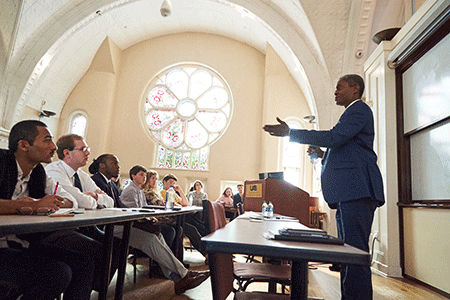Atlanta Fed President Bostic Stayed Busy in Birmingham
Atlanta Fed President Raphael Bostic spent a busy two days in Birmingham October 19–20. During his visit, he enjoyed a tour of Birmingham that gave him a sense of the city's architecture and its history in the civil rights movement.
 Bostic, a former professor at the University of Southern California, also spoke to students at the University of Alabama–Birmingham and visited the Woodlawn Foundation, a nonprofit organization that is revitalizing one of the city's oldest neighborhoods. "He got a chance to meet people who were working on purpose-built communities in Birmingham," said Lesley McClure, Atlanta Fed vice president and Birmingham Branch regional executive.
Bostic, a former professor at the University of Southern California, also spoke to students at the University of Alabama–Birmingham and visited the Woodlawn Foundation, a nonprofit organization that is revitalizing one of the city's oldest neighborhoods. "He got a chance to meet people who were working on purpose-built communities in Birmingham," said Lesley McClure, Atlanta Fed vice president and Birmingham Branch regional executive.
One of the highlights of the visit was a Public Affairs forum at the Birmingham Branch of Atlanta Fed. Bostic joined McClure for a question-and-answer session with an audience of about 60 business executives, educators, and community leaders.
"This was our opportunity to introduce Raphael to businesspeople from diverse companies in Greater Birmingham," McClure said. "People were gratified with his openness and directness in responding."
During the forum, Bostic made these observations:
- Economic conditions are better than current data show. Bostic pointed to reports that show people with high school educations, and those without a high school education, were increasing their participation in the job market. He also noted that feedback the Atlanta Fed collects through its Regional Economic Information Network indicates that employers are starting to offer incentives to attract workers in tight labor markets.
- The United States is not in "a Great Recession environment." The labor market is producing more jobs than it currently needs to reach maximum employment, Bostic said, and "we're not seeing explosive inflation" or "progression significantly towards deflation."
- The economy has changed in a way that produces "big-time" winners. That is, those who have studied to become computer programmers or engineers, for example, will find lots of job opportunities, while a high school dropout will have a harder time. "There are multiple Americas that we have, from an economics perspective," Bostic said. "The challenge for an institution like the Federal Reserve is that our policy instruments are not nuanced like that."
- Technology disruption is not new, but the pace of change from the introduction of fresh technologies is quickening. The challenge today is that "when change happens, how do we navigate through that ... and position workers and give them enough information so that they can find the next thing to transition into," Bostic said. In response to this issue, he noted that the Atlanta Fed recently established a Center on Workforce and Economic Opportunity to connect with community colleges and other entities that provide training to workers to help reposition them in the job market.
- The United States is a safe place for investing capital in an uncertain world.


